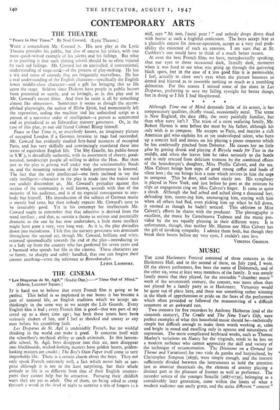CONTEMPORARY ARTS •
THE THEATRE
"Peace in Our Time." By Noel Coward. (Lyric Theatre.)
WHAT a conundrum Mr. Coward is. His new play at the Lyric Theatre provides his public, but also of course his critics, with one more quick-witted example of his talents and his failings. But what is so puzzling is that such shining talent's should be so often vitiated by such sad failings. Mr. Coward has an unrivalled, if conventional, understanding of stage-craft-4 the process of play-making. He has a wit and sense of comedy that are frequently marvellous. He has a real understanding of the English character—specifically the English lower middle-class character—and a gift for bringing this to life upon the stage. Seldom since Dickens have people in public houses been presented so surely, and so lovingly, as in this play and in Mr. Coward's recent films. And then he ruins it all by something almost like obtuseness. Sometimes it seems as though the accom- plished playwright, the author of Blithe Spirit, had momentarily left the typewriter, ceding the machine and his unfinished script to a person of a narrower order of intelligence—a person as sentimental and as prejudiced as an Edwardian nursery governess. Or, in the case of this play, to our old friend Colonel Blimp himself. Peace in Our Time is, as everybody knows, an imaginary picture of occupied London if a German invasion in 1940 had succeeded. Mr. Coward has evidently studied first-hand accounts of occupied Paris, and has very skilfully and convincingly translated these into terms of equivalent English life. The Shy Gazelle, his public-house in S.W.3, is dreadfully authentic, with its assortment of cheery, good- natured, nondescript people all willing to defeat the Hun. But then just as the play is getting well under way the sentimentality floods in, and the mounting tension of the whole performance is lowered. The fact that the only intellectual—one feels inclined to say the only intelligent—character in the play is made into the traitor need not unduly discomfort us. Mr. Coward's prejudice against this section of the community is well known, accords with that of the majority of his audience, and is of no especial consequence to any- body but himself. His introduction of the subject of German music is merely bad taste, but then nobody expects Mr. Coward's taste to be invariably good. Yet in his contempt for intellectuals Mr. Coward ought to remember that that adjective is derived from the word intellect ; and that, to sustain a theme as serious and potentially dramatic as the one he has now undertaken, a little more intellect might have gone a very, very long way. As it is, the play dwindles down into melodrama. I felt that the nursery governess was dominant throughout the second act, though Mr. Coward, brilliant and witty, returned spasmodically towards the end of the play—introducing us to a lady up from the country who has gardened for seven years and a barmaid who spends her life in the cinema. These characters are so funny, so sharply and subtly handled, that one can forgive their creator anything—even the reference to Rosenkavalier.
LEWIS LADBROKE.


































 Previous page
Previous page